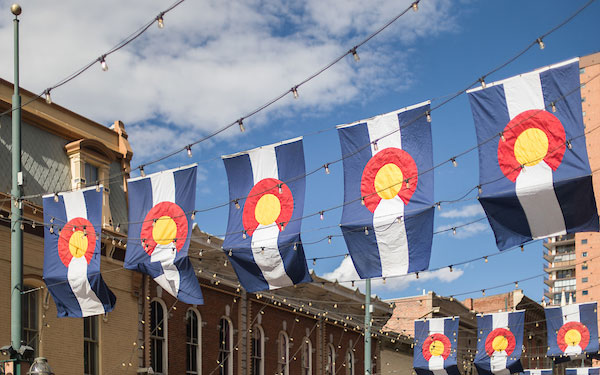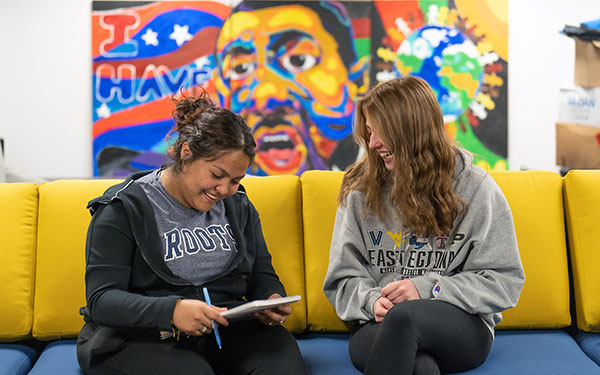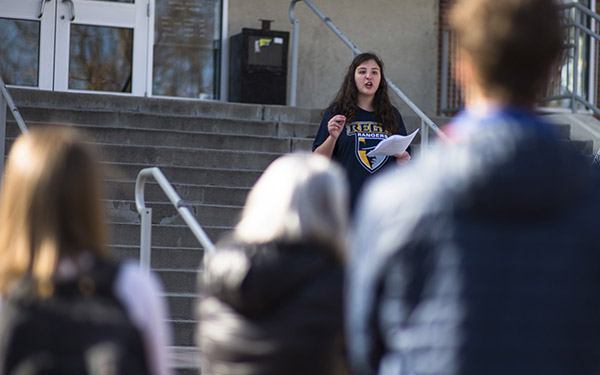
What's On My Ballot?
The Presidential race isn't the only thing on the ballot this fall! State and local positions and policies will also be decided by voters.
Civic engagement is an important extension of our values at Regis University. By voting in local, state and federal elections, each one of us can use our voice to take action on the issues that matter to us most.
Whether you're voting for a presidential candidate, state ballot measure or a local ordinance, here are some resources you can use to be an educated and engaged voter.

GoVoteColorado.gov is the go-to for Colorado election information. You can register to vote in the Centennial State, check your voter registration, update your information and much more. And for City and County of Denver election resources, visit DenverGov.org.
Not sure if you're registered in Colorado?
A lot can happen between elections. Some common reasons why your voter registration may need to be updated include: if you moved within Colorado since the last time you voted, if you've gotten married and/or changed your name, or if you want to change your political party affiliation. Visit GoVoteColorado.gov to check your status in Colorado.
College students who live outside of their home state have a few choices when it comes to voting. Here’s everything you need to know to vote in the right place, in the right way.
Wondering if you’re registered in your home state?
You can check and/or update your registration and get connected to local election resources.


The Presidential race isn't the only thing on the ballot this fall! State and local positions and policies will also be decided by voters.

The Electoral College is a unique aspect of the American Presidential Election. Each state is represented by "electors," and each elector casts one electoral vote for the President and Vice President. In order to win the election, presidential candidates must achieve the majority of electoral votes (at least 270).

Voting - and the right to vote - are core to our American values. Whether it's hosting a voter registration drive or volunteering at the polls, the following organizations are just a few that offer resources and volunteer opportunities.
Students attending a Colorado college or university have the right to register and vote in the state if they reside here. It is up to the student to decide if they prefer to register to vote in Colorado, or in another state (ie, their home state).
For more information about voting while in college, please visit coloradosos.gov/pubs/elections/FAQs/college.html.
Voters in Colorado may register through Election Day. Please note that how you register to vote will impact how you receive your ballot.
To receive your ballot by mail:
If you miss the above deadlines, you may register in person at a voter service and polling center in your county through Election Day.
Yes! As a student, you can register to vote at your school address – even if you live in a dorm room. If your mail is delivered to a Post Office (P.O.) box you can sign an affidavit (or, in some cases, get a letter from the Office of Student Housing and Residence Life) asserting that you live at your dorm address.
While you’ll need to provide an address when you register to vote (this is used for things like assigning your voting districts), registrants experiencing homelessness can list a shelter address or the address where you sleep most often, like a street corner or park address. Check out Nonprofit Vote for more information on voting and homelessness.
All registered voters in Colorado will receive a ballot in the mail. These can be returned by mail, to a ballot box or to an in-person polling place. There is a ballot drop-off box in Regis Square, next to the bookstore.
Most, if not all, election divisions allow you to check online to see if your ballot was counted. In Colorado, you can look up your voter record at GoVoteColorado.gov.
If you are registered and voted in another state, we recommend contacting your local election office for information on mail-in voting.
In Colorado, you are NOT required to show proof of citizenship when voting. Since your citizenship was affirmed when you registered, proof of citizenship is unnecessary when you vote. Registered voters in Colorado ARE required to present ID when voting in-person (and sometimes when voting by mail). Check out the list of acceptable forms of identification to make sure you are prepared on election day. Keep in mind: if you show an ID that has an address on it, the address must be in Colorado but it does not have to match your voter registration.
If you are voting outside of Colorado, be sure to research the voter ID requirements in your state.
If you are voting in-person, typically you must go to a polling location within the county in which you are registered. If you go to a polling place outside your county, they will not have your name on the list of voters. Plan ahead and find your polling place here.
Regis University is a polling place for Denver County and will be open Nov. 1-5 from 7 a.m. to 7 p.m. Voting will take place in the Mountain View Room in Claver Hall.
If you are at the correct polling location and are not on the list of registered voters, you can still cast what is called a "provisional ballot." Ask the poll worker for a provisional ballot, and after the polls close the state will check on the status of your voter registration and whether or not your ballot is valid. The state must notify you as to whether your ballot was counted.
Nope, you don’t have to answer everything. You can vote on as many or as few measures and positions as you like, but we definitely encourage you to do your research on each question and voice your opinion! If you’re not sure what is on your ballot, Ballotpedia can be a great resource, among others.